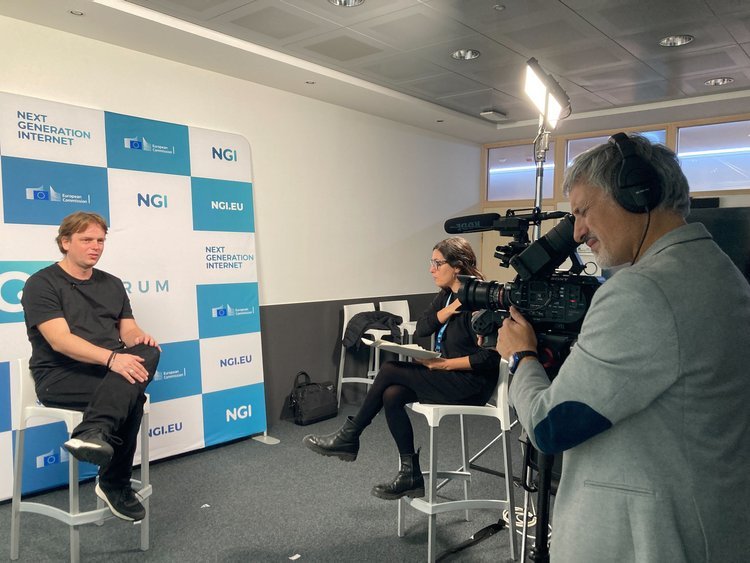Scientific research
Scientific research
WeCount: 1,000 strawberry plants to measure air quality
WeCount: 1,000 strawberry plants to measure air quality
4 de septiembre de 2020


By the editorial team. (Original publication in Spanish)
WeCount, the European citizen science project aimed at counting and measuring mobility in cities that we promote from Ideas for Change, will distribute 1,000 strawberry plants starting tomorrow until October 9th to analyze air quality in Madrid and Barcelona. The action is supported by Medialab Prado, which will provide its facilities for distribution in Madrid, and contributes to the project Vigilantes del Aire, focused on measuring air quality in various Spanish cities thanks to citizen collaboration.
With this activity, WeCount, which also has the collaboration of the neighborhood social network ¿Tienes Sal? and the business association Adigital and its platform for smart and sustainable mobility Smart Mobility, will expand the reach of its experiment. From now on, it will complement traffic and mobility measurement with air quality measurement, providing a more detailed analysis to address issues related to urbanism and pollution in cities.
Since June, the initiative has been distributing sensors called Telraam that residents and citizen communities in Madrid and Barcelona are installing in their windows to collect real-time data on how many cars, heavy vehicles, bicycles, and pedestrians pass through the streets. The information can be checked live via this platform. At the end of the measurement, the type of impactful action that will be taken from the results will be collaboratively determined with the participating community.
“Collaborating with Vigilantes del Aire on their strawberry campaign will allow us to provide the participants in our experiment with a much clearer relationship between mobility issues and air pollution issues. Furthermore, having the collaboration of an institution like Medialab Prado on this journey validates the potential that a project of this kind can have to improve life in cities,” assured Giovanni Maccani, Senior Researcher at Ideas for Change and responsible for the WeCount pilot in Barcelona.
Distribution at Medialab Prado and various points in Barcelona
The distribution of the strawberry plants in Madrid will take place at the facilities of Medialab Prado, located at Calle Alameda, 15, between October 8th and 9th from 10:00 AM to 2:00 PM and from 4:00 PM to 8:00 PM.
For their part, participants in Barcelona will be able to collect the strawberry plants at the Ideas for Change office, located at Ronda Universitat, 33, 1º1ºB (a few meters from Plaza Catalunya) between October 6th and 9th from 9:00 AM to 6:00 PM. Additionally, the plants will be available for collection at other points in the city thanks to the collaboration of other citizen communities. Information about these additional collection points will be made public soon through the communication channels of WeCount and Ideas for Change.
Together with the strawberry plants, information will be distributed regarding the requirements to participate in the entirety of the WeCount experiment and the registration process, which is done through the website www.wecountmovilidad.eu. The organization will request participants to provide a photograph of their window to check if it meets the requirements and will send the sensor to their homes.
All those interested in collecting their plant in both Madrid and Barcelona must register through this link and request an appointment in advance.

Strawberries, one of the best biosensors for analyzing pollution
The validity of strawberry leaves in the study of pollution is proven. The plants act as small environmental monitoring stations through their leaves, which accumulate particles present in the air. By applying biomagnetic techniques, the compounds deposited on each of the leaves can be identified.
The plants must remain on the balconies of the participating individuals for five months. After this period, two or three leaves must be sent along with a form regarding location and observations to the analysis laboratory. With this data, an aggregated study will be carried out to analyze the concentration in different streets and neighborhoods of Madrid and Barcelona. These conclusions will be cross-referenced with WeCount's traffic results to analyze possible relationships and causalities.
The study of the strawberry plants is developed within the framework of the Vigilantes de Aire project, carried out in collaboration with the Ibercivis Foundation, the Pirenaico Institute of Ecology, and the Spanish Foundation for Science and Technology - Ministry of Science, Innovation and Universities, in collaboration with Ideas For Change (through WeCount), Medialab Prado, and other organizations.
By the editorial team. (Original publication in Spanish)
WeCount, the European citizen science project aimed at counting and measuring mobility in cities that we promote from Ideas for Change, will distribute 1,000 strawberry plants starting tomorrow until October 9th to analyze air quality in Madrid and Barcelona. The action is supported by Medialab Prado, which will provide its facilities for distribution in Madrid, and contributes to the project Vigilantes del Aire, focused on measuring air quality in various Spanish cities thanks to citizen collaboration.
With this activity, WeCount, which also has the collaboration of the neighborhood social network ¿Tienes Sal? and the business association Adigital and its platform for smart and sustainable mobility Smart Mobility, will expand the reach of its experiment. From now on, it will complement traffic and mobility measurement with air quality measurement, providing a more detailed analysis to address issues related to urbanism and pollution in cities.
Since June, the initiative has been distributing sensors called Telraam that residents and citizen communities in Madrid and Barcelona are installing in their windows to collect real-time data on how many cars, heavy vehicles, bicycles, and pedestrians pass through the streets. The information can be checked live via this platform. At the end of the measurement, the type of impactful action that will be taken from the results will be collaboratively determined with the participating community.
“Collaborating with Vigilantes del Aire on their strawberry campaign will allow us to provide the participants in our experiment with a much clearer relationship between mobility issues and air pollution issues. Furthermore, having the collaboration of an institution like Medialab Prado on this journey validates the potential that a project of this kind can have to improve life in cities,” assured Giovanni Maccani, Senior Researcher at Ideas for Change and responsible for the WeCount pilot in Barcelona.
Distribution at Medialab Prado and various points in Barcelona
The distribution of the strawberry plants in Madrid will take place at the facilities of Medialab Prado, located at Calle Alameda, 15, between October 8th and 9th from 10:00 AM to 2:00 PM and from 4:00 PM to 8:00 PM.
For their part, participants in Barcelona will be able to collect the strawberry plants at the Ideas for Change office, located at Ronda Universitat, 33, 1º1ºB (a few meters from Plaza Catalunya) between October 6th and 9th from 9:00 AM to 6:00 PM. Additionally, the plants will be available for collection at other points in the city thanks to the collaboration of other citizen communities. Information about these additional collection points will be made public soon through the communication channels of WeCount and Ideas for Change.
Together with the strawberry plants, information will be distributed regarding the requirements to participate in the entirety of the WeCount experiment and the registration process, which is done through the website www.wecountmovilidad.eu. The organization will request participants to provide a photograph of their window to check if it meets the requirements and will send the sensor to their homes.
All those interested in collecting their plant in both Madrid and Barcelona must register through this link and request an appointment in advance.

Strawberries, one of the best biosensors for analyzing pollution
The validity of strawberry leaves in the study of pollution is proven. The plants act as small environmental monitoring stations through their leaves, which accumulate particles present in the air. By applying biomagnetic techniques, the compounds deposited on each of the leaves can be identified.
The plants must remain on the balconies of the participating individuals for five months. After this period, two or three leaves must be sent along with a form regarding location and observations to the analysis laboratory. With this data, an aggregated study will be carried out to analyze the concentration in different streets and neighborhoods of Madrid and Barcelona. These conclusions will be cross-referenced with WeCount's traffic results to analyze possible relationships and causalities.
The study of the strawberry plants is developed within the framework of the Vigilantes de Aire project, carried out in collaboration with the Ibercivis Foundation, the Pirenaico Institute of Ecology, and the Spanish Foundation for Science and Technology - Ministry of Science, Innovation and Universities, in collaboration with Ideas For Change (through WeCount), Medialab Prado, and other organizations.


